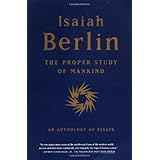
Average Reviews:

(More customer reviews)Are you looking to buy The Proper Study of Mankind: An Anthology of Essays? Here is the right place to find the great deals. we can offer discounts of up to 90% on The Proper Study of Mankind: An Anthology of Essays. Check out the link below:
>> Click Here to See Compare Prices and Get the Best Offers
The Proper Study of Mankind: An Anthology of Essays Review"The Proper Study of Mankind" is an awe-inspiring anthology of seventeen essays in the Humanities by the erudite and engaging Isaiah Berlin. The title may seem a bit stilted for Berlin, who is no starched collar, and whose writing is crisp, crackling, and refreshingly free of pomp and pedantry. But then...so long as one stops and thinks (something going out of fashion these days, but still very much in the spirit of Berlin)...that title does make sense. Of course! "The proper study of Mankind is Man." Not ideals. Not ideologies. But human beings as they really are--and what they actually do.Berlin does not believe in final solutions to human questions. There is no definitive answer once and for all. Nor is there one way, the way, the only way to be, live, act, think, learn, work, write, express oneself, etc. Man is not singular. Man is plural. That is what makes humanity so facinating to "study." The mystery, the drama, the unpredictability of these intractable creatures baffle social scientists, human engineers, controlling personalities who--try as they may!--cannot quite track down, trap, take prisoner the wildly elusive chimera of "human nature."
Ah, but Shakespeare delights in this dazzling dance. And so does Berlin. He writes with riveting wonder at the butterfly flights of human beings, human minds, human wills, human histories. He traces errant clues left behind, on scattered pages, to defy the wind of time. Berlin is sensitive to these fragile fragments of thought, these traces, these rumblings of the human spirit. He is a great historian of ideas--one who listens with a keen sense of hearing for echoes and reverberations in the din of cacophony. He is a perceptive discerner of patterns in space, careers through time, and points of origin. He is original. He does not regurgitate his enormous reading. Rather, he chews, tastes, savors, spits out fat, sucks up marrow, and digests. Thus fortified by this huge feast of reading, Berlin writes something utterly new, all his own, from all that he has read.
The most stirring, most exciting, pages in this anthology are those of the finale (section V) of Berlin's essay on "The Apotheosis of the Romantic Will." When Berlin writes like this, you don't just see light, you feel fire! But then, turning to Berlin's penetrating essay on "The Origins of Machiavelli," the reader is captivated by an utterly different set of sensations: depth, moisture, deep caves, dank smells, dirt, digging in darkness, fearful, clutching one's dagger, probing, deeper--a Dante-esque spiralling down to the bowels of the earth--followed by a swift sudden plunge into the heart of this seminal genius, this Machiavelli, this spectre of the night whose short, simple, virus-like books continue to plague the west, century after century. This too is great reading!
Indeed, all of the essays in this anthology are good. It's just that some are better than others--depending on what you are looking for. The first six essays are predominantly conceptual. They distill the ideas. Thus, they have punch and potency. But they are somewhat dry and lacking in flavor. Reading them, the connoisseur sips pure alcohol. All the while, however, he or she longs for the exquisite taste of an excellent wine: full-bodied, fruity, robust, bursting with bouquet, and delightfully complex. That is to say: the vintage Berlin.
Abruptly after the first six essays, however, the corks pop, the writing flows, and taste buds bathe in champagne. Berlin is at his best--humane, historical, humorous--in the nine essays that follow: four on "The History of Ideas"; three on "Russian Writers"; and two on "Romanticism and Nationalism." The remaining essays, the last two, on "Twentieth-Century Figures" (Churchill and Roosevelt) round out the feast with a delicious dessert. After devouring this book, however, I keep coming back for seconds, thirds, fourths from my favorite essays--those on Romanticism, Nationalism, the Counter-Enlightenment, and, of course, Machiavelli.
Still, each essay in this anthology is ingenious in its own way: the approach, the point of view, the style of writing...everything curved, shaped, fitted--just so--to suit the subject. But there is no forced compartmentalization. Ideas from one essay spill over into another--and can be found swimming, quite freely, in a third. Those who demand strict obedience, straight lines, right angles, cleanliness, order, stability, sterility, etc., will be appalled. But those who despise totalitarianism will be overjoyed.The Proper Study of Mankind: An Anthology of Essays Overview
Want to learn more information about The Proper Study of Mankind: An Anthology of Essays?
>> Click Here to See All Customer Reviews & Ratings Now
0 comments:
Post a Comment